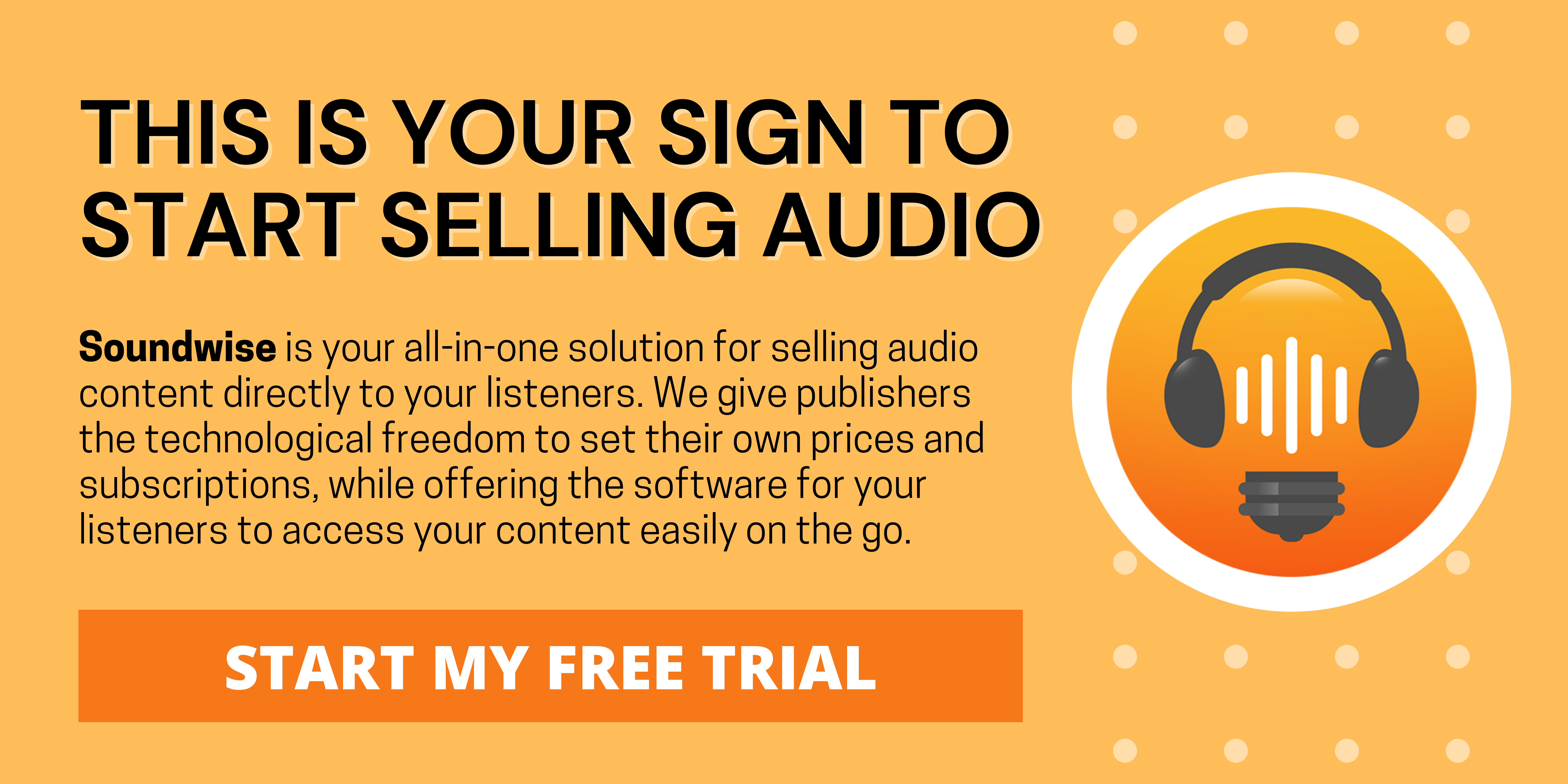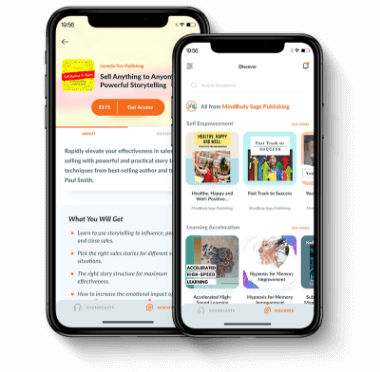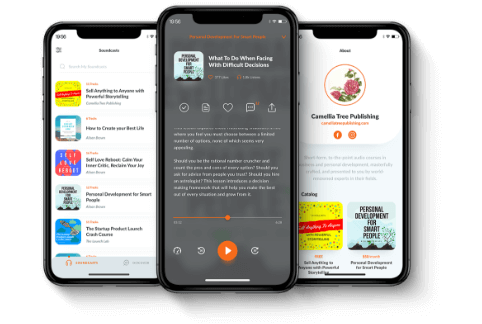Last week I was speaking at an event about podcasting. Afterwards someone came up to me and said he had a most genius idea— he wanted to build a robot to automate the production of podcast interviews. Since I ran an audio publishing company, he asked if I would be interested in his project.
“But why would you want to automate interviews?” I asked.
“So that I can make more episodes faster,” he said.
“And then…?”
“Well, more episodes, more audience.” He looked at me as though I didn’t know how to tie my shoelaces.
I wished him good luck.
In this article I want to propose to you that not only do you not need more podcast interviews, you actually may not want to do an interview podcast!
Qualifiers: If you’re already running an interview podcast and are happy with it, good for you. Keep up the great work and move on with your day. Also, what I’m going to talk about here are mostly useful for independent audio creators who are in an expert/coach/mentor/consultant role, i.e. you’re doing a podcast to educate others and spread knowledge. If you’re not in this category— e.g., you’re in comedy, sports, entertainment— you should probably stop reading now.
These days interview podcasts are popping up faster than shiitake mushrooms after a good summer rain. It seems so easy. As long as you can find people willing to talk to a mic (that’s not hard), all you need to do is to get your question list ready and press the record button. Everyone can do it (and soon, robots), so why not you?
I’ll give you five reasons why not. Some of these reasons may or may not apply to you, depending on how you conduct your interviews. But I hope they will at least get you to think more about your podcast's positioning and the unique value added you offer your listeners. And if you decide you want to incorporate interviews into your podcast, I'll also share some thoughts about how you can do them more effectively.
1. It may dilute your brand
I assume you want to start a podcast to help further build your brand—as an authority in your field, as the leader of your audience tribe, as a useful resource that helps people solve a particular problem. You’re hoping to use podcasting to attract an audience, build trust with the audience, and eventually maybe turn your audience into customers.
However, a typical interview podcast may not be an effective way to achieve any of these goals. Your episode guests will be the experts that your audience count on, not you. Your episodes may provide a lot of useful information. But it’s provided by the guests and says nothing about you. You’re just the production person who keeps the mic on. Unless your goal is to earn the reputation of knowing a lot of experts in your field and asking many good questions, interviewing other people adds little to your own brand.
Think it this way. Guests are interested in being on your podcast because it’s an opportunity to promote themselves and what they offer. If they do a great job at that, you’ll be constantly sending your audience—whom you have worked hard to obtain—away from your podcast to your guests’ platforms. If they suck at that, then they are not interesting guests and your show suffers as a result. Either case, not a lot of gain for you.
“But don’t guests help attract more audience?” You ask. It depends. First, it depends on if you are Oprah. If you’re indeed Oprah, Beyonce would love to be your guest. And that’d help you get new audience because Beyonce has a big following herself. But if you’re a new podcaster with no audience, you’re more likely to attract guests of a similar standing. Those guests will not be very helpful in getting you new exposure. And you’ll likely find yourself doing most of the marketing heavy-lifting on your own anyway.
And also let’s not forget the quality of audience matters. If your podcasting goal is to build your brand and promote your own products/services, 1000 audience who listen to your podcast because of your guests are not as valuable as 500 audience who listen because of you.
But you ask, “What about these other podcasters who became very successful doing only interviews?” Yeah, we all know who they are. And that’s the problem, as I’ll explain below.
2. It’s difficult to stand out
Over the past few years there has been quite a few success stories of interview-style podcasters who started from zero and are now internet famous. As it always happens, the world caught on. And many said to themselves, “Hey, this looks an easy way to be successful. Let me do it too!” The result is a huge influx of me-too interview podcasts, especially in the last two years. Many of these shows are not well planned or executed. Because, again, it seems so easy.
Consequently, the noise level in the podcast market is at all time high. Some hosts—including the guy who wants to build robots for podcasting—think the way to get more audience is to churn out more episodes. So they made their podcast an interview machine, because that’s an easy way to get more content out faster. But in doing so, they have unintentionally commoditized their podcast and made it indistinguishable from other shows in the same category. The situation gets worse if your guests also appear on other similar-themed podcasts.
If you’re hoping to copy earlier success examples and use the interview model to make quick gains in your podcasting career, do realize that you’re late to the game. Interviewing other people used to be a way to stand out in podcasting. Now it’s a sure way to blend in and be type-casted as “just another interview podcast”, if you’re not careful.
There are certainly still ways to do an interview podcast that make you stand out, as we’ll talk about later. But none of those can work without creating your own content. In today’s competitive podcasting world, producing your own original content that has a specific value proposition is your best way to stand out and gain a following, which brings me to the third reason why an interview podcast may not be what you want…
3. It makes it harder to build a lasting audience
If you rely on guests to attract an audience, you’ll be more likely to attract the kind of audience who show up only because they are interested in what one or two particular guests have to say. Will those guests be on your show again tomorrow? No? Then neither will be the transient audience you attracted. And if audience don’t come back for the next episode, it’ll be difficult to build a relationship with them and turn strangers into loyal fans.
Guests come and go. The only common denominator of your podcast is you. If you want to create a podcast that has a high return on your investment of time and money, you need to focus on creating a REAL audience— audience who are “sticky”, who listen to your show because they trust you and want to listen to YOU. Making guest interviews the primary model of your podcast will help you little in this regard.
4. You have less control over content
Many interview podcast hosts suffer from what I call the Shiny Object Syndrome (SOS)— sacrificing the theme and premise of their show for new, interesting guests. Here’s how SOS develops. Say, you’re a horse trainer and you start a podcast about…duh…horse training. You get your first 10 episodes of guest interviews, all talking about how to train horses. No problem. But then you, slowly and but surely, start to realize that scouting for new guests is a lot of work. One day, someone who train pigs approaches you and asks to be on your podcast. This is a top-billing pig trainer who is funny, charismatic, and has a large social media following that she can potentially use to promote your episode about her. And you can get her on your show without doing any outreach work. You think to yourself, “Well, she’s not a horse trainer, but she is awesome and pig training is close enough. I’ll just make this one exception to get an easy episode out and some additional exposure.”
Before you know it, the boundaries of your podcast start morphing. Six months later, you’ve expanded your content theme so much that you decide you have to rebrand your podcast to be about animal training in general. It’s easier to get guests with a more inclusive theme. Besides, the more animals you cover, the more audience you get, right?
Wrong.
First of all, as we discussed, a bigger audience is not better. If you’re a horse trainer, why the heck do you care about any audience who’re only interested in training cats and dogs? Secondly, as the old saying goes, if you want to please everyone, you end up pleasing no one. The boarder your podcast concept, the more vanilla you become, making it difficult to raise your message above the noise.
If you want to build a loyal fan base for your podcast, you need to have a very specific theme that caters to a specific audience, and stick to it. Yet having an interview podcast makes it doubly hard to do so, because of SOS. It’s tempting to shape your podcast to accommodate the guests you can get, instead of the opposite. Many hosts do so unconsciously without realizing they’re diluting their brand and their message.
In addition, no matter how much pre-screening and planning you do, you can’t control what comes out of your guests’ mouths. When the quality of an interview doesn’t turn out to match your expectation (it happens all the time), you’ll still be under the pressure to publish it because your guest has invested their time. When you’re faced with the choice of publishing an episode of subpar quality or spending more precious editing time to “save” an episode, what do you do? This brings me to the fifth reason why an interview podcast may not be worth your time…
5. It distracts you away from creating original content
If you think doing interviews is an easy way to create content, think again. It’s true that the actual episode-creation time doesn’t seem to be much— all you need is to sit down and chat with someone for 30 minutes to an hour, and you have a new episode.
But unlike creating original content yourself, the most time-consuming part of doing interviews is not in creating content, but in what happens before and after.
At the minimum, you need to first do sufficient research to find suitable guests for your show. You’ll then reach out to guests and pitch them with your podcast, which often takes several rounds of email exchanges/phone calls if they have no idea who you are. After that, there is the logistics of settling on when, where and what you will be talking about. After the interview, you’ll likely need to spend more time/money editing the episode, compared to if you were to edit your own content. Because as we discussed early, you can’t control what your guests say and there will be surprises.
All these tasks add up to significant time cost. Yet, notice that none of these tasks, though very much necessary, is about creating actual content. And content IS the reason why people listen to your podcast.
All your audience care about is great content from you. No one gives a dime about how many hours you spend doing research on your guests or how well you pitch your show to them. But with an interview podcast, here’s what happens: you end up spending endless time on tasks that ultimately don’t matter to your audience, while you could have used the hours developing and refining your own original materials that will give you a much better chance in building your own brand and attracting a lasting following.
“So what should I do instead?”
If you’ve read this far, I bet you have at least some clues about what you can do with your podcast instead of hosting interviews. Every individual situation is different. But if your goal is to establish your own brand as an expert/influencer/go-to person in your field, you need to create and nurture a audience community who likes and trusts you for you. That means—
- Step 1: Create your own unique, original podcast content to teach, inform, inspire, entertain.
- Step 2: Promote your content to a target group of potential audience.
- Step 3: Interact with your existing audience to know more about them and what they need help with.
- Step 4: Gather information from your audience to help refine your content.
- Step 5: Repeat.
Soundwise gives you the technical tools to execute these five steps as easily as possible, so that you can start building your own tribe with your podcast from day one. But tools will work if, and only if, you’re committed to developing and improving your own original content. If you don’t have that commitment, no fancy tech—even robots—will help.
“But isn’t creating original content difficult?” You ask. “How am I going to come up with so many episodes on my own?”
First of all, I want to remind you that there are many solo or conversation podcasts that don’t have guests at all, but still succeed in delivering excellent content for their audience week after week. If your fellow humans can do it, why can’t you?
Secondly, no matter whether your podcast theme is on something you do professionally or a side hobby you’re passionate about, if you’ve been involved in your field for a long time, I guarantee you that you know a lot more about it than what you think you know. Because you’re so familiar with your own knowledge and experience, they don’t feel all that important or special to you, let alone being worthy of sharing on your podcast. Half of the battle for you as a content creator is to uncover what you don’t know you know that is actually useful to your audience.
And there are definitely shortcuts to content creation. A while ago I wrote an article on how you can come up with a year’s worth of podcast content ideas in half an hour. Check it out.
“But I still want to have interviews on my podcast…”
“…because I just love doing interviews.” You say.
I hear you. And I’m definitely not saying that all interview podcasts are bad ideas. Having guests on your podcast can potentially add variety and flavor to your show and create opportunities for cross-promotion, that is, if you do it right. And having a list of questions for your guest to answer, record it and call it an episode is hardly “doing it right”.
If you want your guest interviews to be an asset rather than a liability to your brand and community building, pay attention to the following:
1. Think through your value added
What are the unique benefits people get out of listening to your podcast? Having guests is not one of them. Because as we discussed, someone who are on your show today can show up on any number of other podcasts tomorrow to talk about the same thing.
The unique benefits mostly have to come from your own content. But they can also come from how you conduct your interviews. when it comes to the latter, think hard about what you can do that’s different from other podcast interviews in your field. For example, if the average podcast interviews on your topic are 30 minutes long, can you do interviews that’re short and succinct, yet still insightful, to save your listeners’ time? If other podcasters in your field all focus their interviews on the logical steps of how to do xyz, can you focus on the emotional side of doing xyz that no one is talking about, yet everyone wants to know?
One exercise I recommend to people when they get stuck on finding their unique interview style is to go on YouTube and watch different talkshow hosts. Imagine if you listen to three interviews of George Clooney by Jon Stewart, Ellen Degeneres, and Jimmy Fallon respectively, but the interviewers’ voices are masked and you can’t recognize them, can you still tell which interview is done by whom just from the content?
I bet you can. Because Stewart will ask Clooney about his view on tax reform, Degeneres will ask about his first date with his wife, and Fallon will ask him to play a silly game together.
Every great interview host has their own way to run interviews that is intimately tied to who their target audience is and the unique value they offer their audience. Don’t do your next interview without figuring out your own.
2. Stick to your theme and premise
The Shiny Object Syndrome (SOS) is alive and well among interview podcast hosts. But just because a potential guest is rich, famous, and can help promote your podcast doesn’t mean you should take her on, if that person does not fit the theme and premise of your show.
If you want your podcast to stand out from the crowd and build an engaged audience community, you need to be very protective of your theme, niche, and point of view. That means saying no to certain guests who may make your life easier in the short term, but does not contribute to your podcasting brand. That can be hard to do. Otherwise SOS wouldn’t have been a thing. But at least you should try to be aware of it when it’s happening to you.
3. Use guest stories to make your own point
Although you have a guest on your podcast, it’s still your show and you need to take the reins, rather than being the supporting actor to your guest star. Even robots can read out a list of questions to your guests and record a podcast. Ask yourself, what is the value added I can give to my audience beyond dishing out questions?
One straightforward way to offer your audience additional benefit is to take on the role of the commentator, the “film critic”.
Why do people need film critics? Can’t they just watch the movies themselves and have their own opinions? Of course they can. But film critics’ value added lies in their elevated perspectives and analytical acumen. They can spot things in the movie that casual watchers are not aware enough to pick upon . They can give you new ways to look at the same story that opens your mind and helps you appreciate art differently.
And you can do the same for your podcast interviews. Your guests may share whatever personal stories they tell. But what are your audience supposed to learn from their experiences? Most people are lazy. We don’t want to think harder or look deeper. So do the work for us. Tell us what to make of your guests’ stories. Tell us what the main takeaways are and how those can help our life and career. This way, you not only give your audience new perspectives, but also showcase yourself as the expert guide of your audience community.
4. Mix things up
Who says original content and interviews are mutually exclusive? If you can’t make up your mind on whether you should have guest interviews on your podcast or not, do both. Have some episodes where you do all the talking and others where you have a conversation with someone invited.
If you experiment with different models, overtime you will figure out what works best for you and your audience. When you host your podcast on Soundwise, all your subscribers’ listenings are tracked, so you’ll know exactly which episodes of yours are the most popular. And you can message your audience or post comments on your episodes to ask for feedback. For example, a quick message like this to your subscribers can get you straightforward insights from your community—
“Hey guys, I need your opinion. What do you want to hear more of on [your podcast name]? A: guest interviews. B: me talking. Let me know by typing A or B in the comment.”
Main Takeaways
- If you want to use your podcast to build your brand as an expert/influencer in your field and build a real audience, you need to focus on creating your own original content that provides unique value added to a target group of people.
- Doing an interview-based podcast may seem like a quick and easy way to generate content, but it’s likely not the best strategy for either building your brand or building your audience.
- Interviewing other people doesn’t help showcase who you are and what you know. And if you don’t do it right, it’ll actually dilute your podcast’s theme and mission, and make it doubly hard for you to stand out above the noise.
- If you want to build a lasting fan base for your podcast, do everything you can to make sure that your audience listen to your podcast because of you. Guest interviews are just icing on the cake.
- If you decide to have interview episodes on your podcast, don’t let your guests run the show for you. Think about how you can conduct interviews differently, and what other value added you can give to your audience as a host, besides being a question dispensing machine.
* * *
Do you know? Soundwise is the easiest way to start building a real audience community around your podcast and monetize your audios. Get started today.








